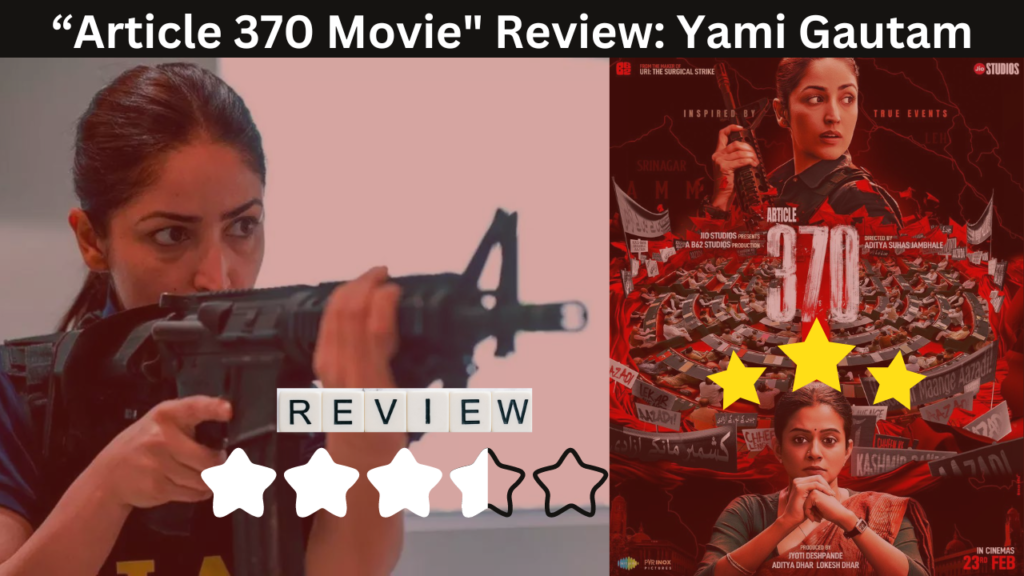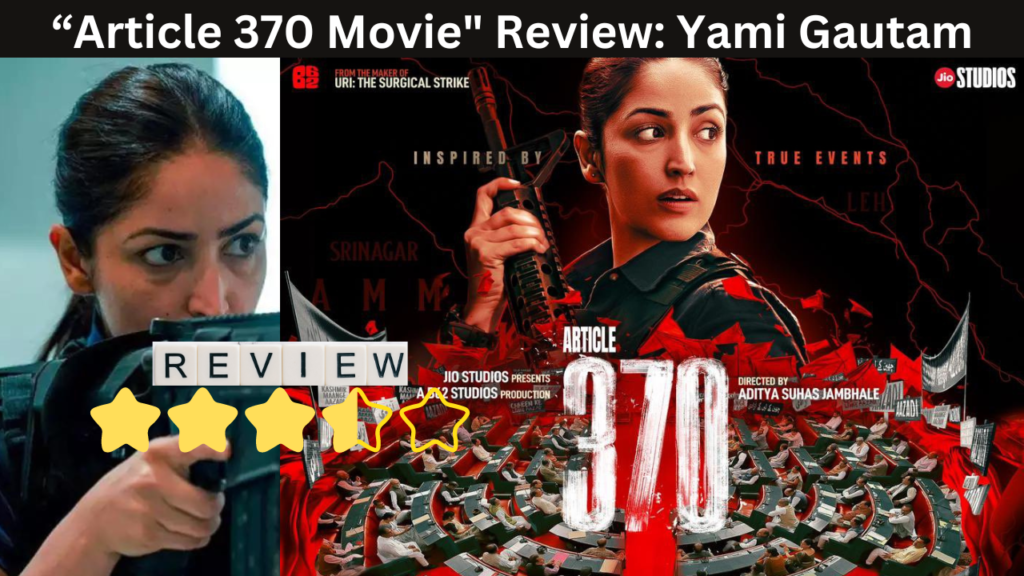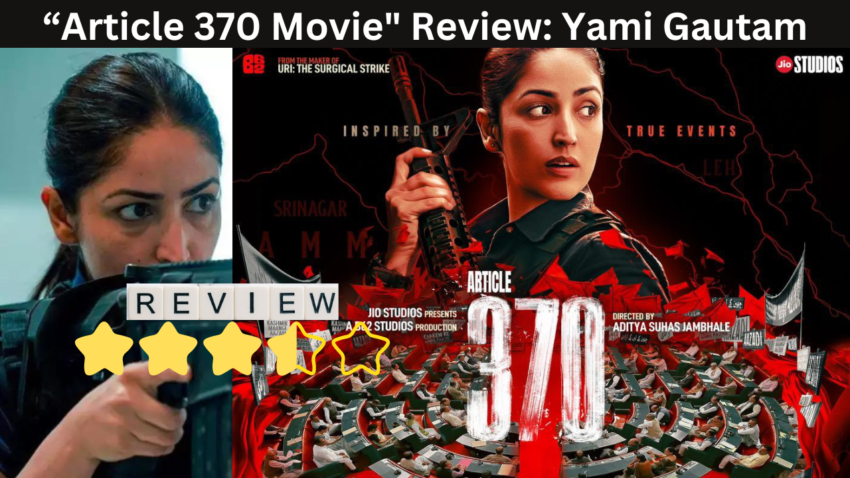“Article 370 Movie” Review : Step into the world of ‘Article 370’, where Yami Gautam and Priya Mani take center stage, weaving a tapestry of intrigue and emotion that unfolds before your eyes. As this cinematic journey graces the big screens on February 23, you might find yourself pondering whether it’s worth embarking upon.
But fear not, dear viewer, for we are here to guide you through the labyrinth of cinematic wonders. Join us as we delve deep into the heart of ‘Article 370‘, unraveling its mysteries and uncovering its hidden gems. Let our review be your compass, steering you towards enlightenment and revelation.
With Yami Gautam and Priya Mani at the helm, ‘Article 370‘ promises a journey unlike any other. So why hesitate? Take the plunge and immerse yourself in a world of passion, intrigue, and unbridled emotion. Your ticket to adventure awaits—don’t let it slip through your fingers. Dive into our review and discover the magic that awaits you.

Table of Contents
As I listened to Prime Minister Narendra Modi’s words echoing through the television screen, a surge of hope washed over me. Finally, a film shedding light on the enigmatic ‘Article 370‘. Imagining myself with a notebook and pen in hand, ready to absorb every detail, I felt a sense of anticipation building within me.
But alas, as the film unfolded before my eyes, a wave of disappointment crashed over me. The makers hastily proclaimed it to be ‘inspired’, distancing themselves from the realm of truth. My heart sank as I realized that this cinematic endeavor was not the educational journey I had envisioned. Creative liberties were taken, blurring the lines between fact and fiction.
Oh, how my expectations were shattered! In my eagerness to learn, I found myself confronted with a narrative veiled in ambiguity. The opportunity to grasp the intricacies of ‘Article 370‘ slipped through my fingers, leaving me yearning for the clarity that never came.

As the credits rolled, my heart swelled with admiration for Aditya Suhas Jambhale’s directorial finesse in ‘Article 370‘. Yet, beneath my admiration lingered a hint of frustration, a nagging feeling that refused to be ignored.
For 2 hours and 40 minutes, I sat on the edge of my seat, grappling with a mixed bag of emotions. The film’s pacing tested the bounds of my patience, dragging its feet through the first half like a sluggish tortoise. Oh, how I yearned for the momentum to pick up, for the story to seize my attention from the get-go!
But alas, it was not to be. The precious minutes slipped away, wasted in a labyrinth of unnecessary exposition, leaving me longing for the meat of the narrative to unravel. It wasn’t until the latter half that the film stirred to life, sprinting towards the climax with a fervor akin to a hare racing towards the finish line.
Despite the rushed drama and predictable twists, I couldn’t shake the feeling that ‘Article 370‘ could have been so much more. A masterpiece in the making, thwarted by its own reluctance to shed the weight of its bloated runtime. Oh, how bittersweet it is to witness potential unfulfilled.
Watch the of Article 370 trailer here: ⬇️
Amidst the trials and tribulations of ‘Article 370‘, a beacon of triumph emerges from the depths of the screen—the powerhouse performances of Priya Mani and Yami Gautam. Their portrayal of women in positions of authority, shouldering the weight of responsibility, leaves an indelible mark on the audience.
Priya Mani, in her role as the joint secretary at the PMO, embodies the intellect and determination driving the narrative forward. Her character’s pivotal role in the abrogation of the special status from Kashmir is a testament to her strength and conviction.
Yami Gautam, portraying the resilient Zooni, carries the burden of a tragic past with grace and resilience. Her portrayal of an ‘arrogant’ officer, reminiscent of Bollywood action heroes, resonates with echoes of defiance and patriotism. Yet, beneath the bravado lies a deeper love for her homeland, a love that fuels her every action.
As the story unfolds, Zooni’s unwavering dedication to her cause becomes a rallying cry for the audience. Her status as a Kashmiri Pandit adds layers of complexity to her character, grounding her actions in a deep-rooted connection to the valley.
However, amidst the applause, a note of amusement arises at Zooni’s seemingly invincible nature. It’s as if she’s destined to always deliver the final blow, to emerge victorious against all odds. While it’s a testament to her strength as a character, it also verges on the edge of incredulity, leaving the audience simultaneously awed and bemused.

Yet, despite the occasional disbelief, there’s no denying the magnetic presence of Priya Mani and Yami Gautam on the screen. Their performances elevate ‘Article 370‘ beyond its flaws, leaving an enduring impression on the hearts of the audience.
As the chapters of ‘Article 370‘ unfolded before my eyes, I found myself transported into the heart of Kashmir‘s tumultuous history, a history marred by betrayal and political machinations. Set against the backdrop of the years between 2015 and 2019, the film endeavors to unravel the harrowing saga of a land torn apart by manipulation and deceit.
With each chapter, the narrative delves deeper into the dark underbelly of Kashmir‘s political landscape. It lays bare the insidious influence of power-hungry politicians and bureaucrats who, in their quest to maintain control, have allowed radicalization to fester unchecked. The youth, once innocent, have been ensnared in a web of propaganda, transformed into unwitting pawns in a dangerous game of unrest and rebellion.
As I watched, I couldn’t help but feel a surge of indignation at the betrayal suffered by the people of Kashmir. Their cries for freedom drowned out by the relentless propaganda machine, their aspirations crushed beneath the weight of political agendas. The film’s portrayal of the two leaders in Kashmir, bearing striking resemblances to Farooq Abdullah and Mehbooba Mufti albeit in a darker hue, serves as a chilling reminder of the corruption festering within the corridors of power.
While the makers may label it as ‘inspired’, the parallels drawn between fiction and reality are impossible to ignore. Through its stark portrayal of the forces at play in Kashmir, ‘Article 370‘ shines a spotlight on the urgent need for justice and accountability in a land besieged by turmoil.

Amidst the tumultuous landscape of contemporary cinema, ‘Article 370‘ stands out as a beacon of restraint and integrity. With a refreshing departure from the tired tropes of Pakistan-bashing and religious stereotypes, the film bravely navigates the treacherous waters of political commentary without succumbing to the temptation of cheap sensationalism.
Gone are the days of clichéd dialogues and over-the-top patriotic anthems; in their place, ‘Article 370‘ offers a nuanced portrayal of patriotism that transcends mere rhetoric. The absence of jingoistic fervor is a breath of fresh air, a testament to the filmmakers’ commitment to authenticity and substance over superficial displays of nationalism.
At the helm of this cinematic triumph is producer Aditya Dhar, whose mastery of production value shines through once again, reminiscent of his earlier work in ‘Uri’ (2019). The film’s high production quality serves as a testament to the dedication and craftsmanship of the entire team, elevating the viewing experience to new heights.
Yet, amidst the praise, a sobering truth emerges: ‘Article 370‘ is not devoid of political undertones. While it refrains from overt jingoism, it is not immune to the subtle currents of propaganda. The spotlight cast on the BJP government, particularly in the lead-up to general elections, serves as a reminder of the complex interplay between art and politics.

As I reflect on the journey of ‘Article 370‘, I am reminded of the power of cinema to provoke thought and challenge conventions. In a landscape fraught with divisiveness and sensationalism, this film stands as a testament to the enduring power of storytelling to inspire change and ignite conversation.
As I watched Arun Govil and Kiran Karmarkar don the roles of PM Narendra Modi and Home Minister Amit Shah, a sense of unease settled over me. Their portrayals, though well-intentioned, felt like caricatures, lacking the depth and nuance befitting their real-life counterparts. Yet, amidst the sea of political figures, they emerged as the lone beacons of compassion, their characters imbued with a semblance of humanity amidst the chaos.
Jawaharlal Nehru, too, fell victim to the film’s revisionist lens. The Ajay Devgn-narrated introduction laid blame at his feet, painting him as the architect of the ‘blunder’ in Kashmir. It was a sobering reminder of the complexity of history, of how narratives can be manipulated to suit a particular agenda.
“Article 370 Movie” Review Watch ⬇️
Read Also :- Rakul Preet Singh and Jackky Bhagnani beautiful journey of marriage 2024
As the film unfolded, I found myself grappling with the implausible theories and skewed perspectives presented on the Kashmiri movement for autonomy. The narrative danced on the edge of disbelief, prompting a nagging urge to delve deeper into the annals of history for the truth buried beneath the layers of fiction.
Indeed, Prime Minister Narendra Modi’s assertion that ‘Article 370‘ would provide “correct information” echoed in my mind. The film, despite its flaws, served as a catalyst for introspection, urging viewers to seek out the untold stories and untangle the webs of misinformation that shroud our understanding of Kashmir‘s turbulent past.
In the end, ‘Article 370‘ left me with more questions than answers, a testament to the power of cinema to provoke thought and spark dialogue. It may not have provided all the answers, but it certainly ignited a flame of curiosity within me, compelling me to seek out the truth hidden beneath the surface of political rhetoric.
Entertainment! Entertainment! Entertainment! 🎞️🍿💃 Click to follow our Whatsapp Channel 📲 Your daily dose of gossip, films, shows, celebrities updates all in one place

Owner & Author – Jammu Deals Automobile enthusiast and founder of Jammu Deals. Sharing trusted updates, tips, and insights on cars, bikes, and the latest in the auto world.


1 thought on “Article 370 Movie Review: Yami Gautam, Priya Mani impress in film on Kashmir politics”